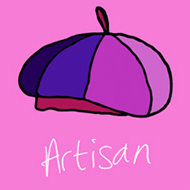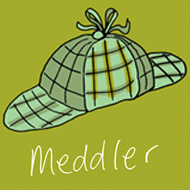
Which type of leader are you?
By Adrian Wheeler, MSc FRSA, The Fairlight Project
As the owner of your business you are the single biggest factor affecting its success or failure. Most external forces are outside your control but your skill and your style are within your control and these will determine the trajectory of your business, the clients you retain, the work you win, the talent you attract (and keep) etc.
The four archetypes; Artisan, Hero, Meddler and Strategist, come from research done at Cranfield School of Management that showed how owner-managers tend to behave differently at different stages during the growth of their businesses. None of these behaviours are intrinsically wrong but understanding them and what brings them about allows us to be in more control. I built on this research while doing a psychology masters at Henley and focused just on agency owners.
See if you recognise yourself.
 THE ARTISAN is very ‘hands-on’ and spends most of their time doing billable work, either alone or as part of a small team of ‘do-ers’. You’re very much one of the gang. You’re highly skilled and you enjoy working with people like yourself. Their respect and recognition is important to you. Most ‘managing’ is done informally on an ad hoc basis – by the coffee machine, in the pub or shouted across the studio. The chances are you out-grew your previous agency, knowing you’d never really have creative freedom if you stayed put. Partly because you’re too busy working on live projects and partly because you make decisions ‘intuitively’, there is little management skill or experience in your business. Time is money and you’d rather be working on billable hours, doing ‘great work’, than on processes to improve the quality or profitability of your business, let alone strategising for the future.
THE ARTISAN is very ‘hands-on’ and spends most of their time doing billable work, either alone or as part of a small team of ‘do-ers’. You’re very much one of the gang. You’re highly skilled and you enjoy working with people like yourself. Their respect and recognition is important to you. Most ‘managing’ is done informally on an ad hoc basis – by the coffee machine, in the pub or shouted across the studio. The chances are you out-grew your previous agency, knowing you’d never really have creative freedom if you stayed put. Partly because you’re too busy working on live projects and partly because you make decisions ‘intuitively’, there is little management skill or experience in your business. Time is money and you’d rather be working on billable hours, doing ‘great work’, than on processes to improve the quality or profitability of your business, let alone strategising for the future.
Your business growth prospects, relative to your market, are low and to grow your business (if that’s what you want), means treating ‘management’ with the same importance as delivering client work (yikes).
 THE HERO You have a Herculean task on your hands as you try to extricate yourself from day-to-day tasks and spend more time managing your business. You attend courses and read books in order to acquire the management skills you lack. You introduce new systems but you’re the only person who really understands them and so delegating is always a struggle. The Hero must not only learn new management skills, but also learn how to train others to use them. In big businesses these skills are readily available but they’re expensive and don’t easily scale down to fit the small agency model.
THE HERO You have a Herculean task on your hands as you try to extricate yourself from day-to-day tasks and spend more time managing your business. You attend courses and read books in order to acquire the management skills you lack. You introduce new systems but you’re the only person who really understands them and so delegating is always a struggle. The Hero must not only learn new management skills, but also learn how to train others to use them. In big businesses these skills are readily available but they’re expensive and don’t easily scale down to fit the small agency model.
This is a critical point in the journey of the owner-manager. In order to grow substantially, the business needs to increase its level of management skill. The Hero must get good at motivation, leadership, organisation design and development, and get to grips with strategic management issues in general. If, like the majority, they fail to do this, they become “The Meddler”. The research identified that nearly 90% of owner-managers are either Heroes or Meddlers.
 THE MEDDLER spends long hours working on ever more sophisticated systems and processes. They’re probably the “MD” by now and have left their functional responsibilities behind. Their big mistake is that they don’t let go of routine management tasks and as their systems become increasingly complex, they’re forced to spend more and more time checking for errors. They hire people for key roles but never really let them get on with their jobs. Their relentless detective work continually uncovers crimes that only they know how to solve. “Why is nobody using the system correctly?” they ask. “If I wasn’t here, the place would fall apart.” They say, but the reality is that if a skilled management team was in place, they’d be out of a job. Every non-compliance error they find only serves to de-motivate their employees while reinforcing their own belief that “You just can’t get the staff”. They can get the staff but when those new recruits realise that they’re ‘not being paid to think’, according to the study, 60% leave within 2 years.
THE MEDDLER spends long hours working on ever more sophisticated systems and processes. They’re probably the “MD” by now and have left their functional responsibilities behind. Their big mistake is that they don’t let go of routine management tasks and as their systems become increasingly complex, they’re forced to spend more and more time checking for errors. They hire people for key roles but never really let them get on with their jobs. Their relentless detective work continually uncovers crimes that only they know how to solve. “Why is nobody using the system correctly?” they ask. “If I wasn’t here, the place would fall apart.” They say, but the reality is that if a skilled management team was in place, they’d be out of a job. Every non-compliance error they find only serves to de-motivate their employees while reinforcing their own belief that “You just can’t get the staff”. They can get the staff but when those new recruits realise that they’re ‘not being paid to think’, according to the study, 60% leave within 2 years.
Meddlers must engage and enable their staff to fully contribute towards the success of the business. Delegating management functions is the first step. Time to stop restructuring and start developing your people (you know who you are).
 THE STRATEGIST will divide their time roughly into three parts. The first two thirds will be spent managing today’s business – monitoring performance, co-ordinating projects, resolving problems and, (very importantly), developing the management skills of their teams to the highest appropriate level. The last third is spent shaping the future of their business. The Strategist takes their own development seriously, investing in their own ability to lead, motivate, inspire and coach others, whilst developing their peer group network. Who they are, becomes as important as what they do. They must increase their strategic knowledge of business in general – developing a viewpoint that is broader and deeper than merely delivering their own product or service.
THE STRATEGIST will divide their time roughly into three parts. The first two thirds will be spent managing today’s business – monitoring performance, co-ordinating projects, resolving problems and, (very importantly), developing the management skills of their teams to the highest appropriate level. The last third is spent shaping the future of their business. The Strategist takes their own development seriously, investing in their own ability to lead, motivate, inspire and coach others, whilst developing their peer group network. Who they are, becomes as important as what they do. They must increase their strategic knowledge of business in general – developing a viewpoint that is broader and deeper than merely delivering their own product or service.
The natural path of development for the relationship between the owner-manager and their team, is to pass from Artisan to Hero or Meddler and – for the happy few – on to become a Strategist. The right combination of the right training, mentoring and coaching supported by a strong team can facilitate a smoother transition than if you try to be ‘Head of Everything’. If the management team takes over most of the owner-manager’s routine management tasks, then the owner-manager can direct their energies to creating a brighter future for the business.
Obviously this is all easier said than done. Making the transition to Strategist assumes that you want your business to grow. You may not, but the reality is that it’s difficult not to grow and businesses tend to either be in a cycle of growth or decline. Growth requires change and change means mastering new skills and behaviours. The expert must become the novice and some find this daunting. It’s a complex process that requires resilience, bravery, resourcefulness, self-awareness, discipline and a degree of sacrifice – especially so if you are, as most agency owners are, also the creative talent, the product and the service.
Understanding yourself, your unique qualities, what motivates you and where you want to take your business is a good first step. In the words of psychologist Paul Watzlawick, ‘you cannot not communicate’ – your leadership style comes from you and affects everything you and your team do. If you take the time to understand it, you’ll be better placed to develop it.

 THE ARTISAN is very ‘hands-on’ and spends most of their time doing billable work, either alone or as part of a small team of ‘do-ers’. You’re very much one of the gang. You’re highly skilled and you enjoy working with people like yourself. Their respect and recognition is important to you. Most ‘managing’ is done informally on an ad hoc basis – by the coffee machine, in the pub or shouted across the studio. The chances are you out-grew your previous agency, knowing you’d never really have creative freedom if you stayed put. Partly because you’re too busy working on live projects and partly because you make decisions ‘intuitively’, there is little management skill or experience in your business. Time is money and you’d rather be working on billable hours, doing ‘great work’, than on processes to improve the quality or profitability of your business, let alone strategising for the future.
THE ARTISAN is very ‘hands-on’ and spends most of their time doing billable work, either alone or as part of a small team of ‘do-ers’. You’re very much one of the gang. You’re highly skilled and you enjoy working with people like yourself. Their respect and recognition is important to you. Most ‘managing’ is done informally on an ad hoc basis – by the coffee machine, in the pub or shouted across the studio. The chances are you out-grew your previous agency, knowing you’d never really have creative freedom if you stayed put. Partly because you’re too busy working on live projects and partly because you make decisions ‘intuitively’, there is little management skill or experience in your business. Time is money and you’d rather be working on billable hours, doing ‘great work’, than on processes to improve the quality or profitability of your business, let alone strategising for the future. THE HERO You have a Herculean task on your hands as you try to extricate yourself from day-to-day tasks and spend more time managing your business. You attend courses and read books in order to acquire the management skills you lack. You introduce new systems but you’re the only person who really understands them and so delegating is always a struggle. The Hero must not only learn new management skills, but also learn how to train others to use them. In big businesses these skills are readily available but they’re expensive and don’t easily scale down to fit the small agency model.
THE HERO You have a Herculean task on your hands as you try to extricate yourself from day-to-day tasks and spend more time managing your business. You attend courses and read books in order to acquire the management skills you lack. You introduce new systems but you’re the only person who really understands them and so delegating is always a struggle. The Hero must not only learn new management skills, but also learn how to train others to use them. In big businesses these skills are readily available but they’re expensive and don’t easily scale down to fit the small agency model. THE MEDDLER spends long hours working on ever more sophisticated systems and processes. They’re probably the “MD” by now and have left their functional responsibilities behind. Their big mistake is that they don’t let go of routine management tasks and as their systems become increasingly complex, they’re forced to spend more and more time checking for errors. They hire people for key roles but never really let them get on with their jobs. Their relentless detective work continually uncovers crimes that only they know how to solve. “Why is nobody using the system correctly?” they ask. “If I wasn’t here, the place would fall apart.” They say, but the reality is that if a skilled management team was in place, they’d be out of a job. Every non-compliance error they find only serves to de-motivate their employees while reinforcing their own belief that “You just can’t get the staff”. They can get the staff but when those new recruits realise that they’re ‘not being paid to think’, according to the study, 60% leave within 2 years.
THE MEDDLER spends long hours working on ever more sophisticated systems and processes. They’re probably the “MD” by now and have left their functional responsibilities behind. Their big mistake is that they don’t let go of routine management tasks and as their systems become increasingly complex, they’re forced to spend more and more time checking for errors. They hire people for key roles but never really let them get on with their jobs. Their relentless detective work continually uncovers crimes that only they know how to solve. “Why is nobody using the system correctly?” they ask. “If I wasn’t here, the place would fall apart.” They say, but the reality is that if a skilled management team was in place, they’d be out of a job. Every non-compliance error they find only serves to de-motivate their employees while reinforcing their own belief that “You just can’t get the staff”. They can get the staff but when those new recruits realise that they’re ‘not being paid to think’, according to the study, 60% leave within 2 years. THE STRATEGIST will divide their time roughly into three parts. The first two thirds will be spent managing today’s business – monitoring performance, co-ordinating projects, resolving problems and, (very importantly), developing the management skills of their teams to the highest appropriate level. The last third is spent shaping the future of their business. The Strategist takes their own development seriously, investing in their own ability to lead, motivate, inspire and coach others, whilst developing their peer group network. Who they are, becomes as important as what they do. They must increase their strategic knowledge of business in general – developing a viewpoint that is broader and deeper than merely delivering their own product or service.
THE STRATEGIST will divide their time roughly into three parts. The first two thirds will be spent managing today’s business – monitoring performance, co-ordinating projects, resolving problems and, (very importantly), developing the management skills of their teams to the highest appropriate level. The last third is spent shaping the future of their business. The Strategist takes their own development seriously, investing in their own ability to lead, motivate, inspire and coach others, whilst developing their peer group network. Who they are, becomes as important as what they do. They must increase their strategic knowledge of business in general – developing a viewpoint that is broader and deeper than merely delivering their own product or service.